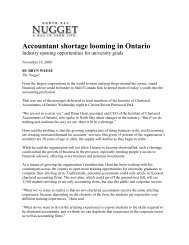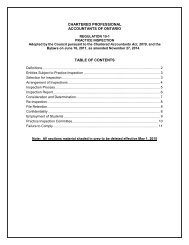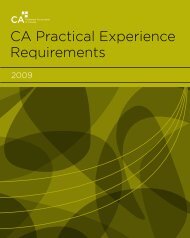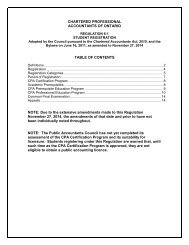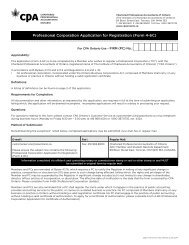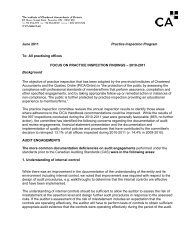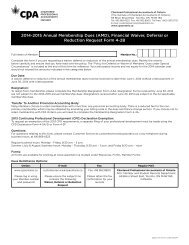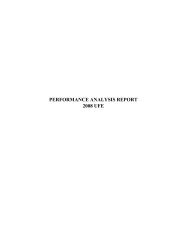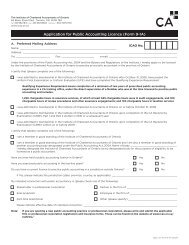CM Autumn Template - Institute of Chartered Accountants of Ontario
CM Autumn Template - Institute of Chartered Accountants of Ontario
CM Autumn Template - Institute of Chartered Accountants of Ontario
You also want an ePaper? Increase the reach of your titles
YUMPU automatically turns print PDFs into web optimized ePapers that Google loves.
Disciplinary Notices<br />
The Discipline Committee has the responsibility <strong>of</strong><br />
determining whether a member, firm or student charged<br />
with pr<strong>of</strong>essional misconduct is guilty or not guilty <strong>of</strong> the<br />
charge(s). If the determination is guilty, the Discipline<br />
Committee makes an order with respect to sanction. The<br />
Discipline Committee may also approve Settlement<br />
Agreements proposed by the Pr<strong>of</strong>essional Conduct<br />
Committee and a member.<br />
The Discipline Committee applies the principles <strong>of</strong><br />
rehabilitation, specific deterrence and general deterrence<br />
to determine sanctions appropriate to the particular<br />
circumstances <strong>of</strong> each individual case and in the public<br />
interest.<br />
The Discipline Committee has wide powers to help facilitate<br />
rehabilitation, including the power to order supervised<br />
practice and reinvestigation. Generally, members whom the<br />
Discipline Committee concludes are incapable <strong>of</strong> being<br />
rehabilitated or are otherwise ungovernable are expelled.<br />
There are also cases where expulsion is thought essential<br />
as a general deterrent to other members.<br />
The written reasons <strong>of</strong> the Discipline or Appeal Committee in<br />
a specific case may be accessed by visiting the <strong>Institute</strong>'s<br />
website at www.icao.on.ca or obtained from Diane Williamson<br />
at the <strong>Institute</strong> by e-mail at dwilliamson@icao.on.ca or<br />
telephone at 416-969-4282 or 1-800-387-0735, ext. 282.<br />
Discipline Hearings<br />
Dianne Elizabeth Chandler, Havelock, was found guilty <strong>of</strong><br />
one charge under Rule 104 <strong>of</strong> failing to promptly reply in<br />
writing to any letter from the <strong>Institute</strong> in which a written<br />
reply is specifically required, and one charge under Rule<br />
203.2 <strong>of</strong> failing to co-operate with <strong>of</strong>ficers, servants or<br />
agents <strong>of</strong> the <strong>Institute</strong> who have been appointed to arrange<br />
or conduct a practice inspection or review or an<br />
investigation on behalf <strong>of</strong> the Pr<strong>of</strong>essional Conduct<br />
Committee. Mrs. Chandler failed to submit requested<br />
documents to the Director <strong>of</strong> Practice Inspection and failed<br />
to respond to correspondence from the Associate Director<br />
<strong>of</strong> Standards Enforcement. Mrs. Chandler was fined $1,000<br />
and ordered to co-operate with Practice Inspection by<br />
providing the requested documentation.<br />
Ronald Edward Day, Thunder Bay, was found guilty <strong>of</strong> two<br />
charges under Rule 201 <strong>of</strong> failing to conduct himself in a<br />
manner that will maintain the good reputation <strong>of</strong> the<br />
pr<strong>of</strong>ession and its ability to serve the public interest. While<br />
a partner in a firm, Mr. Day, in the name <strong>of</strong> his consulting<br />
company, prepared cash flow projections on behalf <strong>of</strong> a<br />
client using firm resources and collected fees outside <strong>of</strong><br />
the partnership without informing his partners. Mr. Day<br />
42 CheckMark • <strong>Autumn</strong> 2009<br />
failed to disclose the fees on his personal income tax<br />
return and failed to collect GST on the fees, thereby<br />
evading payment <strong>of</strong> tax properly payable. Without his<br />
partners’ knowledge, Mr. Day failed to bill a client for<br />
pr<strong>of</strong>essional services rendered, but instead used a contra<br />
agreement to pay monies he personally owed the client.<br />
He failed to disclose this benefit received from the client on<br />
his personal income tax return and failed to collect or remit<br />
GST, thereby evading payment <strong>of</strong> tax properly payable. Mr.<br />
Day was fined $5,000, charged costs <strong>of</strong> $7,500, and<br />
suspended from membership for six months.<br />
James Edward Horn, Toronto, was found guilty <strong>of</strong> one<br />
charge under Rule 202 <strong>of</strong> failing to perform his pr<strong>of</strong>essional<br />
services with due care. Mr. Horn, while engaged to<br />
conduct a compliance audit <strong>of</strong> the campaign finances <strong>of</strong> a<br />
candidate in accordance with the Municipal Elections Act,<br />
1996, failed to: conduct appropriate audit procedures to<br />
enable him to determine the existence <strong>of</strong> apparent<br />
contraventions <strong>of</strong> the Act; perform an adequate or<br />
appropriate audit <strong>of</strong> campaign contributions; perform an<br />
adequate or appropriate audit <strong>of</strong> expenses related to<br />
campaign banners; identify related apparent<br />
contraventions <strong>of</strong> the Act in his compliance audit report;<br />
and appropriately disclose a scope limitation related to the<br />
audit <strong>of</strong> advertising expenses in his compliance audit<br />
report. Mr. Horn was fined $2,500 and charged costs <strong>of</strong><br />
$5,000.<br />
Gavin Gershon Lange, Richmond Hill, was found guilty <strong>of</strong><br />
two charges under Rule 101 <strong>of</strong> failing to comply with the<br />
bylaws, regulations and rules <strong>of</strong> pr<strong>of</strong>essional conduct <strong>of</strong><br />
the <strong>Institute</strong>, one charge under Rule 201.1 <strong>of</strong> failing to<br />
maintain the good reputation <strong>of</strong> the pr<strong>of</strong>ession and its<br />
ability to serve the public interest, one charge under Rule<br />
204.1 <strong>of</strong> failing to remain free <strong>of</strong> any influence, interest or<br />
relationship which would impair pr<strong>of</strong>essional judgment or<br />
objectivity or which, in the view <strong>of</strong> a reasonable observer,<br />
would impair pr<strong>of</strong>essional judgment or objectivity and three<br />
charges under Rule 206.1 <strong>of</strong> failing to perform pr<strong>of</strong>essional<br />
services in accordance with generally accepted standards<br />
<strong>of</strong> practice <strong>of</strong> the pr<strong>of</strong>ession. Mr. Lange, while engaged in<br />
public accounting, failed to: apply for or obtain a public<br />
accounting licence; register his practice; pay the annual<br />
practitioner fee; and register or obtain a certificate <strong>of</strong><br />
authorization for his pr<strong>of</strong>essional corporation. Without such<br />
registrations and notifications, Mr. Lange’s practice was not<br />
subject to practice inspection. Further, Mr. Lange signed<br />
and issued a review engagement report attached to the<br />
financial statements for a company <strong>of</strong> which his brother<br />
was a director and 50 per cent shareholder. The financial<br />
statements contained errors and Mr. Lange failed to<br />
document steps taken to satisfy himself <strong>of</strong> the plausibility<br />
or accuracy <strong>of</strong> various assertions in the statements. Mr.<br />
Lange also performed review engagements for two clients



